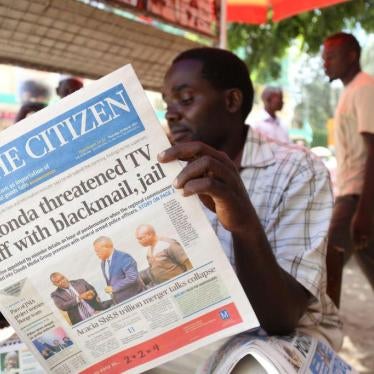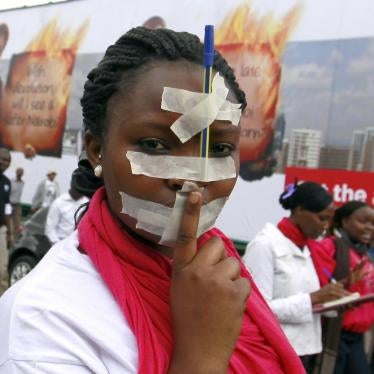His Excellency Pierre Nkurunziza
President of the Republic of Burundi
Office of the President
Bujumbura
Burundi
April 25, 2013
Your Excellency,
Re: Concerns About New Media Law in Burundi
I am writing to urge you not to sign the new media law adopted by the Senate on April 19, 2013, and to prevent it from being enacted in its current form. I urge you instead to send it back to Parliament for amendment and ensure that the final version restores media freedoms, in line with Burundi’s national and international commitments.
The version of the law adopted by the Senate erodes the fundamental right to freedom of expression, guaranteed in the Burundian Constitution and in regional and international conventions, including the African Charter on Human and Peoples’ Rights, which Burundi has ratified.
Among other things, this law would undermine the protection of sources, limit subjects on which journalists may report, impose new fines for media found in violation of the law, and require journalists to have a minimum level of education and professional experience.
Human Rights Watch, which has closely followed the progress of this law, believes that its adoption could curtail free speech and independent journalism. Several provisions of the law would severely restrict the ability of journalists to cover events in Burundi, setting back Burundians’ hard-won struggle for free expression, among other rights.
The version adopted by the Senate contains several articles that could also expose Burundian journalists to a range of sanctions for ill-defined offenses. For example, it requires journalists to refrain from reporting information that could affect “national unity; public order and security; morality and good conduct; honor and human dignity; national sovereignty; the privacy of individuals; the presumption of innocence.” It restricts reporting on issues that involve “propaganda of the enemy of the Burundian nation in times of peace as of war”, “information that could affect the credit of the state and the national economy” and “information that could affect the stability of the currency.” The law also states that journalists should broadcast only “objective information” and that sources “must be rigorously checked,” without further explanation.
This sweeping and vague language could potentially criminalize reporting on such topics as inflation, security issues or political killings, and could punish journalists for analytical or opinion pieces on these or other subjects.
The law also requires journalists to have a baccalaureate in journalism or its equivalent or at least two years of professional experience, thereby unduly creating a barrier to young and aspiring journalists, including those without a formal qualification. The United Nations Human Rights Committee, which provides the definitive interpretation of the International Covenant on Civil and Political Rights to which Burundi is a state party, states, in General Comment no. 34 on Freedom of Expression, that general state systems of registration or licensing of journalists are incompatible with freedom of expression.
Although this new legislation eliminates prison terms contained in the 2003 law which it would replace, it imposes very high fines – some as high as 6 million Burundian francs (roughly US$3,750) – which many radio stations and newspapers would be unable to afford. The Senate reduced the maximum fine from 8 million to 6 million Burundian francs, but even this amount remains out of reach of many Burundian media outlets.
We recognize that Burundi has made important strides in recovering from decades of armed conflict. Nevertheless, the country has had spikes in violence in recent years, with a sharp increase in political killings following the 2010 elections. Human Rights Watch has documented the implication of state agents in many of these cases. Burundian journalists have played a critical role in reporting on these killings and giving a voice to the victims’ families. Under the law passed by the Senate, reporting on these cases and on the impunity of state agents could be considered illegal if it were interpreted as affecting national unity or order.
We are especially concerned about the timing of this draft legislation in advance of elections planned in Burundi for 2015. Human Rights Watch has documented a pattern of harassment and threats against journalists and other perceived critics of the government during the last election period in 2010.
Burundi has a vibrant independent media sector, yet journalists have frequently been threatened and intimidated by state agents over articles and broadcasts deemed critical of the government.
After most opposition parties boycotted the elections in 2010 and several of their leaders fled the country, the ruling party, the National Council for the Defense of Democracy-Forces for the Defense of Democracy (CNDD-FDD) appeared to treat journalists, as well as civil society organizations, as the new opposition. Throughout 2011 and 2012, radio journalists, in particular, were repeatedly harassed and summoned to the public prosecutor’s office to account for their broadcasts.
Human Rights Watch believes that a cornerstone to Burundi’s democratic future is the ability of journalists to work without hindrance and to report on sensitive issues. We therefore appeal to you to reject the new media law in its current form, thereby demonstrating your commitment to preserving Burundi’s dynamic media sector rather than trying to undermine it through repressive legislation.
Yours sincerely,
Kenneth Roth
Executive Director
CC :
Mme Léocadie Nihazi
Minister for Telecommunications, Information, Communication and Relations with the Parliament






